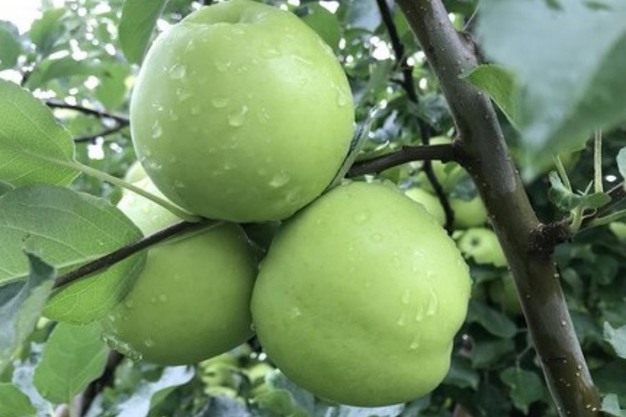East Coast apples are facing a few challenges this week. In Pennsylvania, assessments are being done of the fruit still on the trees following Hurricane Helene which came through the state as a tropical storm. "In Pennsylvania, we are out in the orchards assessing to see if that rain is going to shorten our season with splits and cracks in some of the late-hanging varieties on the trees," says Brandon Ruppert of Cohen Produce Marketing.
Those varieties include Ambrosia, Pink Lady, Fuji, Evercrisp, and WildTwist along with some Red Delicious, Golden, and Granny Smith apples. Leading up to the storm, the crop in Pennsylvania was thought to be average. "Now we're thinking we'll definitely be below average," says Ruppert. "However it will still be a robust and good quality crop that our growers will carry year-round."
The rain that came through wasn't thankfully torrential nor were there winds–it was more misty and drizzly for nine days. "Now they're back in the orchards with full manpower to get things picked again," he says.
Apples on the water
At the time of the interview, Cohen Produce Marketing was also awaiting word on the status of the East Coast ports strike. The company had export fruit loaded, which headed out on water before the strike on October 1. "That was a relief but now that boat is anchored at a port that is not open and we don't know if the steamship line will omit the port and keep sailing to its destination or stay anchored in Charleston until it opens back up again," says Ruppert.

Meanwhile, the company is getting calls to price and/or load fruit and it can't respond to those calls until it knows what's going to happen. "Then, as soon as things open back up again, we have to reassess if there's going to be additional prices and surcharges from the steamship lines, which we expect. Or if there's going to be pricing and surcharges increasing from logistics because of trucking costs potentially going up," he says.
In the meantime, he says orders have already been lost to the European apple season because the international markets it works with source fruit from around the world. "They knew this strike was going to become a reality and so they made strategic decisions to make sure they still have fruit coming," says Ruppert. "Unfortunately, those are orders that we can't get back. So when things are open again, we have to jump back in and get in front of those customers who we hope will stick with us."
Export varieties
In terms of varieties, Galas, Red Delicious, Ambrosia, and the pink-blushed Granny Smith–coloring on an apple that is common to the East Coast and one that has gained popularity since the pandemic–were the varieties being exported and are now in controlled atmosphere (CA) storage.
Apples also have a cost ceiling which means alternative transportation, such as air or other ports that are open, isn't viable per se. So for now, Ruppert says it's maintaining its assessment of its season and wants to be ready to go when the ports reopen. "The export business is a way to move extra apples, such as last season which had too many apples and it was much needed. When something like this happens, apples will need to move at a healthy rate domestically and hopefully, they won't get a lot of fruit waiting to go somewhere. We have gone out to look for some alternative destinations that are more local that we typically don't handle. It's just diversifying a bit more than usual," he says.
 For more information:
For more information:
Brandon Ruppert
Cohen Produce Marketing
Tel: +1 (717) 975-9111
[email protected]
http://www.cohenproduce.com/
